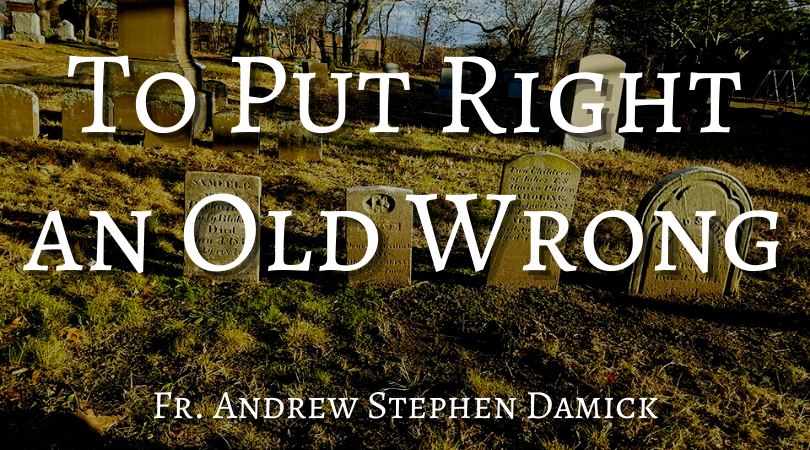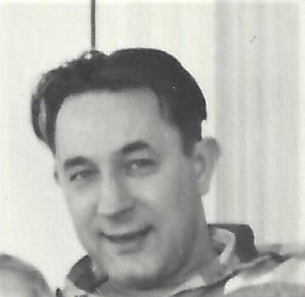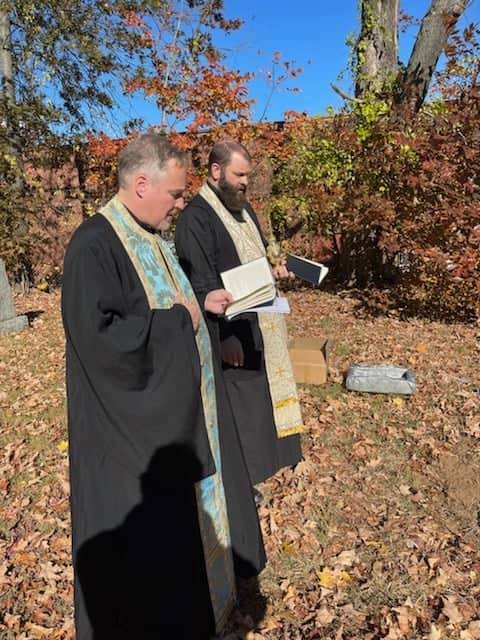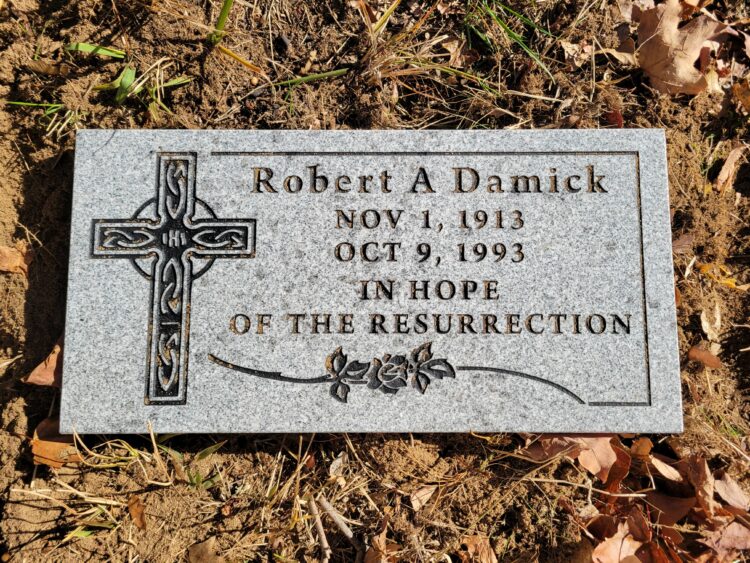
In 2017, a retired New Haven police detective named Frank was doing research on indigent burials in his city, and he was scanning through records of these men and women buried typically without any friends or family present. Most of them died alone, and when it came time to bury them, the State of Connecticut hired a local funeral home to put them in the ground with no funeral and no fanfare.
As their remains were placed in the ground, there were probably no tears nor sighs for these people forgotten by their families and friends for whatever reason. In every story there certainly was a broken relationship at its heart, but the brokenness is almost always eventually forgotten like the person himself.
Frank had become interested in the State Street Cemetery in Hamden, a suburb immediately adjoining New Haven, when he learned of the 1995 murder of a 6 month old infant who was buried there. He and other members of the New Haven Police Department came together and bought a headstone for the child. Later, he discovered that it had been stolen.
It turns out that the man who was responsible for the cemetery (and some eighteen others) was not only utterly negligent when it came to making sure headstones got installed and burials happened in the right places, but his home was later discovered to be filled with headstones he had stolen, presumably to be sold for scrap. In many cases, burials were in haphazard plots, sometimes on top of older burials. For many families, it was a nightmare. Among those headstones stolen was this young child’s.
Frank is a member of a religious fraternal group and on its committee especially dedicated to the memory of veterans, and of course many of the homeless and indigent whom he was recording had been veterans. So Frank was entering their names on the Find-a-Grave website so that, even if there was no headstone marking their burials, their names and which cemetery they were in would be marked somewhere.
In 2017, Frank added the name Robert Damick as an entry on the website, noting that he had been buried in 1993 by the New Haven Funeral Service with no known survivors at the time. His last place of residence was owned by the Public Housing Authority.
Four years later, I discovered the entry for Robert on the website.
An Old Wrong

I don’t remember when I first heard about my great uncle. I never met him that I am aware, though I was 18 years old when he died. He was the older brother of my grandfather Albert.
I don’t know what exactly happened between them, but sometime in their forties or fifties, they had a falling out, and as the story goes, they never spoke to each other again. Robert died in 1993 just a month shy of 80 years old, and no one was there with him.
As far as we know, he had never married. There is a tale that he perhaps had fathered a child out of wedlock in his youth, but if that is true or what that child’s name might have been, we just don’t know. I don’t know if the authorities who took responsibility for his body reached out to my grandfather or not. My grandfather died 10 years after his brother.
In a sad irony, the two brothers died within just 30 miles of each other and had never reconciled.
I don’t remember when I learned their story, but even though I had never met Uncle Bob, the fact that this falling out had followed the two brothers into their graves had bothered me for years. In my private prayers, I pray for the departed of my family, whatever their religious commitments, and I had prayed for both Albert and Robert for a long time. And that is where I had left it.
Finding My Uncle
There was something this past January that made me think of Robert again, though, which is why I began researching him again, to see what clues I could find about his life, and so I lit upon the entry that Frank had made in January 2017. It was sad to me to see such a terse entry, an icon of sorts of a life likely with a lot of sadness and ending alone.
In other records, Robert’s last known profession was listed as “handyman” or “doing odd jobs,” which basically meant he was unemployed. The family’s impression of him is that he never really did much with his life, though that may just be my grandfather’s unhappiness with his brother filtering to the rest of us. We may not ever know.
Out of the blue, I contacted Frank (whose name I did not even know at the time) to ask if the entry on the website could be transferred to me so that I could update it with whatever I could find. He was happy to do so, and thus began my correspondence with him. He told me much of the sad tale of that cemetery, which still remains in somewhat sad condition but does have a group of volunteers caring for it every so often. The cemetery itself is owned by a corporation that has no surviving members. So it is, legally speaking, abandoned. No one is actually responsible for it.
This past summer, my grandmother Elizabeth died. Robert had been her brother-in-law, but of course she had not seen him in many years herself. She died in Colorado, where she spent her last few years near other family, and her remains were sent to Middletown, Connecticut, for interment next to her husband. I joined my father and uncle in Connecticut for a memorial service and for the interment.
As I was making plans to journey to Connecticut, I remembered Uncle Bob. And I looked at the map and realized I would be only a half hour away from where he was buried.
So, over the weekend I was there, I went to the State Street Cemetery to see what I could see. There was, of course, no marker where my great uncle had been buried, but in correspondence with Frank during my visit, he told me roughly the part of the small cemetery where the homeless and penniless had been buried. I paced along the rows of burials, wondering if I was walking near his grave.
I came upon a man who had been mowing some of the grass, and I spoke with him. I asked him if he was part of the volunteer group who took care of the cemetery. He told me that he was taking care of some of his family’s graves, and he complained that the city was not doing its duty in ensuring that the cemetery did not deteriorate. I told him about my uncle and a little of the family history.
“I hope you can find him,” he said.
And that’s when I decided that I would.
Frank suggested that I contact the funeral home that had buried him. My experience as a clergyman taught me that someone always picks up the phone at funeral homes, so even though it was a Sunday afternoon, I called them. They were still in business, and they answered. The man on the other end of the phone said he remembered when they used to bury the indigent for the state, and he complained a little that they didn’t get paid very much for it.
They did have a record of burying Robert, it seemed, and which cemetery it was in, but nothing else. No plot number was listed. I asked him what I could do about that. He said that the town clerk might have something, since a burial permit would have been issued, and those usually include plot numbers.
After the interment in Middletown on that Monday morning, I called the Hamden town clerk to see if they had a record.
“What cemetery was that again?”
“State Street, ma’am.”
“Oohhh, I am so sorry, sir.”
“Yes, yes, I know.”
“We get a lot of calls about that one. There probably isn’t anything.”
“Can you check anyway?”
“Of course. But don’t get your hopes up, okay?”
“Okay.”
Twenty minutes later, she called me back.
“Sir? I found your uncle. And… I can’t believe this, but… the plot is listed. It’s C1. Do you want a copy of the record?”
I did, and thirty minutes later, I had a copy of the 1993 burial permit in my hand, and I was driving back to the cemetery. Arriving, I walked around it to see if I could figure out where C1 might be. Using entries from the Find-a-Grave website that noted plot numbers and matching them to headstones I found in the cemetery, I triangulated where I was pretty sure it was. I sent one more note to Frank to ask if he knew. Sure enough, I had found it. And I was standing right next to where he was buried.
It was just grass and leaves on the edge of this semi-abandoned cemetery. But I had found it.
To Put Right a Wrong
 On my way home, I called my dad to tell him what I had found. And I told him I wanted to buy Uncle Bob a headstone and put it there. He told me he wanted to pitch in, and he said I should tell my uncle (his brother) what I had found. So I did that, too, and he also said he wanted to pitch in.
On my way home, I called my dad to tell him what I had found. And I told him I wanted to buy Uncle Bob a headstone and put it there. He told me he wanted to pitch in, and he said I should tell my uncle (his brother) what I had found. So I did that, too, and he also said he wanted to pitch in.
When I got home, I started researching headstones. I had never thought about this before, but of course here in 2021, you can order custom made headstones and have them delivered to your house. So I found something modest but fitting, and I ordered it.
Eventually it arrived at my home. It was heavy, but it was also just right.
This past Wednesday, I drove back toward New Haven with the headstone in my trunk. I made a stop in Middletown to pray for my grandparents, and then to the cemetery in Hamden. My old friend Fr. Gregory met me there. And so did Frank, whom I had never to that point met in person but whose care for the forgotten had helped me and my family to remember.
With my bishop’s blessing, we prayed the prayers for the repose of a non-Orthodox Christian. I don’t know what Robert might have thought about God in his life, but I am pretty sure that his mother had seen to it that he had been baptized a Lutheran, so perhaps there was something there. We placed the headstone and blessed it with holy water.
It was Uncle Bob’s funeral, just 28 years late.
Memory Eternal
 In the Orthodox Church, we believe in prayer for both the living and the departed. Its purpose is to repent on their behalf. That does not mean that we don’t believe people aren’t responsible for themselves and their relationship with God and His Kingdom, but it does mean that we believe that we can affect that relationship. We also believe that God is merciful and hears our prayers.
In the Orthodox Church, we believe in prayer for both the living and the departed. Its purpose is to repent on their behalf. That does not mean that we don’t believe people aren’t responsible for themselves and their relationship with God and His Kingdom, but it does mean that we believe that we can affect that relationship. We also believe that God is merciful and hears our prayers.
As Christians, we are bound up not only with God and each other but with all of humanity. It is our task to pray for one another, to honor one another, and to work to heal hurts, participating in God’s work of putting things right that have gone wrong.
I do not know what exactly went wrong between my grandfather and his brother in this life. I do not know what memory of angry words or bitter thoughts might have accompanied them into their graves.
I do know this though: God loves us, and He desires that every man should be saved and come to the knowledge of the truth.
And so I pray that even by our meager prayers, what was broken in this life is now healed in the life that is to come.
May all their memories be eternal.


May his memory be eternal, Father.
Padre, this detective story sounds like it is right up your alley. In any event, your family must be very proud of you and your works. I feel honored to know you.
That was beautiful. Thanks for sharing.
Father, I loved this story. I am a listener of both Amon Sul and Lord of Spirits podcasts and love both.
I also am a member of Find-a -Grave, although when I joined it was primarily to be able to find graves of more or less famous people; then I learned about the work that they do like that which you described in this post. It’s a valuable service that goes unnoticed.
Thanks for the post.
May your uncle’s memory be eternal.
Bill Baker
What a great story. Being from Connecticut myself, with lots of family members both living and deceased there, this really hit home somehow. We all, really and truly are connected with all humanity.
My grandfather had a longstanding feud with his brothers. They had barely spoken in decades by the time my grandfather was dying of cancer. My father remembered the feud between his father and uncles, and knew my grandfather wanted to make some amends. So one summer he took my grandfather on a road trip back up for one last visit to northern Minnesota. The meeting between the 3 old men was tense, but all knew it would be the last, and they did part at least on speaking terms. 6 months later my grandfather died. Life is too short to let feuds go on forever – make your peace while you can. Other branches of my family have come and gone leaving their feuds unresolved, and relationships severed. I’m glad you were able to put this one to right, just as I’m glad my father could help his father do likewise. Memory Eternal to all.
Made me cry. Such a beautiful story much needed in this world of sorrows. Thank you!
Memory eternal.
Fr., I’d be interested to know your thoughts on cremation, given your approach and appreciation for the deceased.
I am of course against cremation, because that is what the Church teaches and practices, and of course it also makes sense to me. Willfully to destroy the body is not in keeping with our proper honor of the departed. Burial is also in imitation of Christ Himself.
(Yes, I know that Orthodox Christians in Japan often cremate. And I have been told by a local there that this actually is not required by law but is instead a very entrenched cultural custom. There are actual Orthodox burial grounds there, though.
Also, yes, sometimes people’s bodies do get burned up in circumstances out of control of those who would otherwise be seeing to the funeral. In no case does cremation mean that a person is beyond hope of salvation or that God “can’t put them back together,” etc. The point is not what “effect” cremation has on someone’s destiny but whether it is right for us to treat a body that way.)
Thank you.
Father,
I’m puzzled/troubled by your apparent understanding that you had to ask your bishop for approval to pray for the departed soul of your departed uncle. In my case, since I’ve not asked, nor do I presently intend to ask episcopal approval to pray for the repose of the souls of all my departed relatives, none of whom were Orthodox, nor many of my non-Orthodox friends whose departed souls I daily pray for, the five-page list of their names I keep for that purpose would be much shorter.
Serving a funeral service for a non-Orthodox Christian requires a blessing from the bishop.
This wasn’t about the private prayers one might do at home. This was a liturgical service which is a bit out of the ordinary.
Serving services is something clergy do only with the blessing of the bishop, in any event. Our ministry is an extension of theirs and not something we have on our own.
Thanks for making the distinction, Father which I completely understand.